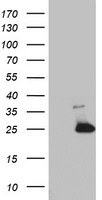MRPS11 Mouse Monoclonal Antibody [Clone ID: OTI2D1]
CAT#: CF802879
Carrier-free (BSA/glycerol-free) MRPS11 mouse monoclonal antibody, clone OTI2D1 (formerly 2D1)
Formulation: Standard
Specifications
| Product Data | |
| Clone Name | OTI2D1 |
| Applications | WB |
| Recommended Dilution | WB 1:2000 |
| Reactivities | Human |
| Host | Mouse |
| Isotype | IgG2a |
| Clonality | Monoclonal |
| Immunogen | Full length human recombinant protein of human MRPS11 (NP_073750) produced in E.coli. |
| Formulation | Lyophilized powder (original buffer 1X PBS, pH 7.3, 8% trehalose) |
| Reconstitution Method | For reconstitution, we recommend adding 100uL distilled water to a final antibody concentration of about 1 mg/mL. To use this carrier-free antibody for conjugation experiment, we strongly recommend performing another round of desalting process. (OriGene recommends Zeba Spin Desalting Columns, 7KMWCO from Thermo Scientific) |
| Purification | Purified from mouse ascites fluids or tissue culture supernatant by affinity chromatography (protein A/G) |
| Conjugation | Unconjugated |
| Storage | Store at -20°C as received. |
| Stability | Stable for 12 months from date of receipt. |
| Predicted Protein Size | 20.4 kDa |
| Gene Name | Homo sapiens mitochondrial ribosomal protein S11 (MRPS11), transcript variant 1, mRNA; nuclear gene for mitochondrial product. |
| Database Link | |
| Background | Mammalian mitochondrial ribosomal proteins are encoded by nuclear genes and help in protein synthesis within the mitochondrion. Mitochondrial ribosomes (mitoribosomes) consist of a small 28S subunit and a large 39S subunit. They have an estimated 75% protein to rRNA composition compared to prokaryotic ribosomes, where this ratio is reversed. Another difference between mammalian mitoribosomes and prokaryotic ribosomes is that the latter contain a 5S rRNA. Among different species, the proteins comprising the mitoribosome differ greatly in sequence, and sometimes in biochemical properties, which prevents easy recognition by sequence homology. This gene encodes a 28S subunit protein that contains a high level of sequence similarity with ribosomal protein S11P family members. A pseudogene corresponding to this gene is found on chromosome 20. Sequence analysis identified two transcript variants that encode different protein isoforms. [provided by RefSeq, Jul |
| Synonyms | HCC-2 |
| Reference Data | |
Documents
| Product Manuals |
| FAQs |
| SDS |
Resources
| Antibody Resources |
Other Versions
| SKU | Description | Size | Price |
|---|---|---|---|
| TA802879 | MRPS11 mouse monoclonal antibody, clone OTI2D1 (formerly 2D1) |
USD 447.00 |
|
| TA802879AM | MRPS11 mouse monoclonal antibody,clone 2D1, Biotinylated |
USD 509.00 |
|
| TA802879BM | MRPS11 mouse monoclonal antibody,clone 2D1, HRP conjugated |
USD 509.00 |
|
| TA802879S | MRPS11 mouse monoclonal antibody, clone OTI2D1 (formerly 2D1) |
USD 200.00 |
{0} Product Review(s)
Be the first one to submit a review






























































































































































































































































 Germany
Germany
 Japan
Japan
 United Kingdom
United Kingdom
 China
China




